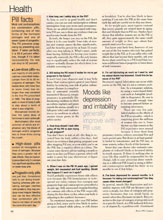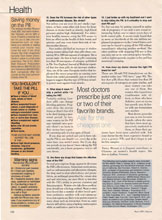The Best News Yet About the Pill!
The latest studies and the best experts conclude it’s safer than ever
How much do you really know about the birth control pill? If you’re on it now, are you sure you’re taking it correctly?
Ten million American women currently use the Pill, and eight out of 10 will use it at some point in their reproductive lives, making it the most popular reversible method of birth control in the United States. Yet recent studies show that we’re less clear than we should be on how oral contraceptives work, how best to take them and how to weight their risks and benefits. Answers to these questions aren’t easy to come by, since drug labeling is complicated and sessions with doctors are too brief. A recent onslaught of new research and the occasional scary headline add to the confusion.
Because so many women are misinformed about the Pill, GLAMOUR asked the nation’s top contraception experts for answers to your most common and perplexing Pill questions.
1. How long can I safely stay on the Pill?
As long as you’re in good health and don’t smoke, you can use oral contraceptives without interruption from your teens until menopause. There are no added health risks associated with long-term Pill use, nor is there any evidence that you need to take breaks from the Pill.
In truth, the longer you stay on the Pill, the better it is for your health: Your risks of uterine and ovarian cancer decline significantly, and the benefits persist for at least 15 years after you stop taking it. What’s more, aside from having children (or having your ovaries surgically removed), the Pill is the only known way to significantly reduce the risk of ovarian cancer—a deadly disease for which there is no reliable screening test.
2. Will taking the Pill make it harder for me to get pregnant in the future?
It won’t hurt your chances—and it may help them. Oral contraceptives protect your future fertility by reducing your risk of pelvic inflammatory disease (a complication of untreated sexually transmitted diseases), ectopic pregnancy (a potentially life-threatening condition in which an embryo implants and grows outside the uterus, usually in a fallopian tube) and endometriosis (a condition in which uterine tissue grows in the pelvic cavity).
3. How long should I wait after going off the Pill before I start trying to get pregnant?
You don’t have to wait at all—the drug is excreted from the body within a few days. And there’s no evidence that getting pregnant soon after stopping Pill use, or even while you’re on the Pill, has a negative effect on a fetus. The reason some doctors advise waiting a month or more is so you’ll have a period, which will make it easier for your obstetrician to figure out your due date.
4. When I was on the Pill 10 years ago, I gained weight, felt nauseated and had spotting. Would that happen if I went on it again?
You’d probably experience fewer side effects now because the Pill formulations in widespread use today contain less estrogen and progestin than oral contraceptives prescribed a decade ago. Still, nausea and irregular bleeding are common side effects of the Pill—especially during the first three cycles, when your body is adjusting to the synthetic hormones.
To counteract nausea, take your Pill before going to bed, since you’re less likely to notice an upset stomach while asleep, or with dinner or breakfast. You’re also less likely to have spotting if you take the Pill at the same hour each day and are careful not to skip any doses.
As for weight gain, most experts contend that excess pounds are related more to aging, diet and lifestyle than to Pill use. Studies have shown that whether women are on the Pill or off, they gain approximately the same small amount of weight as they age—about four pounds over five years.
You know your body best, however—if you are one of the few women who truly has gained weight due to the Pill, or if you suffer other side effects that last beyond three months, ask your doctor about switching to a Pill brand that contains a different form of progestin or lower doses of both hormones.
5. I’m not lubricating as much as I used to, and my sexual desire has lessened. Could this be because of the Pill?
Decreased vaginal lubrication can occur while you’re on the Pill, but it’s not a common problem. As a temporary solution, try using a water-based lubricant such as Astroglide (available in drugstores). Be sure to give yourself enough time to become aroused before attempting intercourse.
There are very few published studies on the effects of the Pill on sexuality—which is surprising given the millions of women who use it. Some doctors say that women on the Pill experience more arousal because it frees them from pregnancy worries, reduces menstrual flow and eases period pain. But desire is at least partially fueled by testosterone, and the Pill may, in some women, reduce levels of this hormone.
Insist that your doctor take seriously complaints of reduced libido or lessened ability to reach orgasm. If there is nothing else in your life that could be responsible for the change, talk to your physician about switching to a different Pill brand or using a different contraceptive method for three to six months to see if that helps.
6. I’ve been depressed for several months. Is it because I’m taking oral contraceptives? Can they cause other mood changes?
In general, moods like depression and irritability improve with Pill use because you receive a steady, low dose of estrogen and progestin—hormones that can wreak havoc with moods when they fluctuate too much. But a reaction to the type of estrogen or progestin used in a specific brand, or a Pill-induced deficiency of vitamin B6—a problem with older, higher-dose pills—may have the opposite effect in some individuals.
“I had one patient who went on the Pill right after giving birth and thought she had a really bad case of postpartum depression for seven years,” recalls Robert A. Hatcher, M.D., professor of gynecology and obstetrics at Emory University School of Medicine in Atlanta. “She never thought the Pill might be to blame for the way she felt, and no doctor ever singled it out either. When I switched her from a combination oral contraceptive to a low-dose progestin-only Pill, the depression vanished.”
Many factors influence depression, but if you and your doctor suspect the Pill may be exacerbating feelings of sadness and lethargy, it won’t hurt to switch to another formulation while you’re exploring other causes. In some cases, your doctor may also recommend that you take 20 milligrams of vitamin B6 daily.
7.Since I’m not ovulating while on the Pill, why do I still get PMS?
Premenstrual syndrome is thought to be triggered—at least in part—by the drop-off in estrogen and progestin that occurs right before your period. This hormonal shift happens even when you’re on the Pill, but the drop is less dramatic—that’s why oral contraceptives tend to lessen PMS symptoms in most users.
PMS is poorly understood, however, and other hormones besides estrogen and progestin, as well as nonhormonal factors, are also likely to be involved, Switching brands—especially to a progestin-only Pill—may help to ease your symptoms.
8. Does the Pill raise my risk of breast cancer?
The latest study to examine this question offers reassuring news. Last year an international group of researchers pooled and reanalyzed data from nearly 154,000 women who were subjects of previous Pill trials. As reported in the journals The Lancet and Contraception, there was no increase in the rate of breast cancer among women who had used the Pill 10 to 20 years before. (Data beyond 20 years isn’t available, but experts predict similar results.) These findings held true for all women, regardless of family history, the number of years they’d taken the Pill, and whether they’d taken high- or low-dose pills, as well as many other factors.
The study did find a slightly increased risk of being diagnosed with the disease among women currently taking the Pill and those who’d quit less than 10 years before. (In women ages 25 to 29, for instance, 4.3 cancers per 10,000 were detected among Pill users, compared with 3.5 cancers among women not on the Pill.) But since long-term use doesn’t appear to affect the risk of cancer in later years, when breast cancer is more common, researchers speculate that young Pill users have more frequent breast exams than nonusers—suggesting that cancers are simply being detected earlier. Also reassuring was the finding that Pill users of all ages who developed cancer tended to have localized—and thus more easily treated—tumors.
The bottom line: Breast cancer is extremely rare among young women, and using the Pill when you’re young does not appear to increase your risk of developing the disease later in life. In fact, some researchers predict that oral contraceptive use may turn out to be protective against breast cancer after menopause, when women are most vulnerable to the disease.
9. I recently read that certain types of oral contraceptives can increase your risk of blood clots. Which types and how big is the risk?
Let’s put things in perspective: Among pregnant women, about 60 out of 100,000 will develop blood clots in the leg or lungs. Among healthy women who don’t use the Pill, the rate is about four out of 100,000.
Compared with the risk of clots during pregnancy, the risk of developing them from Pill use is relatively low. Data from European studies released last year showed that pills containing low doses of so-called older progestins, levonorgestrel and norethindrone, each year caused about 10 to 15 women per 100,000 to experience blood clots. Concerns arose, however, when the studies appeared to show that pills containing newer progestins, desogestrel and gestodene, were associated with 20 to 30 cases per years. (Desogestrel pills go by the brand names Desogen and Ortho-Cept; gestodene pills aren’t sold in the U.S.)
This apparent doubling of risk frightened many women. However, both the Food and Drug Administration and the American College of Obstetricians and Gynecologists have examined the studies carefully and concluded that the actual risk of blood clots associated with newer progestins is negligible. Both groups advised that women using Desogen and Ortho-Cept should keep on using them; there was no reason to switch to another brand.
10. Does the Pill increase the risk of other types of cardiovascular disease, like stroke?
Not unless you are over 35 and smoke cigarettes, or have some other risk factor for heart disease or stroke (such as obesity, high blood pressure and/or high cholesterol). For otherwise healthy women, using the Pill seems to have no effect on the health of their hearts and arteries—and may even lower their risk of cardiovascular disease.
Past studies did find an increase in strokes among women taking high-dose pills (those containing 80 to 100 micrograms of estrogen). But a recent study—the first to look at pills containing less than 50 micrograms of estrogen—published in The New England Journal of Medicine reported that low-dose pills do not increase strokes. Also, one of the same European studies that implicated the newer progestins as causing more blood clots ended prematurely, just as evidence began to suggest that this type of Pill may actually protect users against heart attacks.
11. What does it mean if I skip a period while I’m taking the Pill?
Probably nothing. Low-dose pills can change bleeding patterns. Progestin thins the uterine lining so there’s less to be shed during a menstrual period. In fact, some women on the Pill may routinely miss periods—there’s no harm to that—or may have a period consisting of only a few spots of blood.
If you skip one period and you’ve been taking the Pill as you should—i.e., every day at the same time—you needn’t worry. But if you skip two periods or you haven’t been taking the Pill consistently, use a home pregnancy test or call your doctor.
12. Are there any drugs that lessen the effectiveness of the Pill?
Several prescription drugs appear to decrease the Pill’s effectiveness. Antiseizure medications, such as carbamazepine and phenytoin; rifampin, the drug used to treat tuberculosis; and griseofulvin, an antifungal prescribed for certain skin and nail infections, are most likely to interfere with the Pill’s ability to prevent ovulation and thus pregnancy. Women who take these medications should use a backup method. Many women have heard that a number of antibiotics interfere with oral contraceptives, but experts say there is no proven reason to worry about such an interaction. Even so, some doctors still advise using a backup contraceptive while on antibiotics—just to be safe.
13. I just broke up with my boyfriend and I want to stop taking the Pill. Is it unhealthy to stop and start Pill use?
No, but you may be putting yourself at undue risk of pregnancy if you start a new sexual relationship before you’ve taken seven days of birth control pills. A recent study found that as many as two-thirds of the one million unplanned pregnancies in the United States each year can be traced to going off the Pill without immediately adopting another method. The other problem with stopping Pill use is that you miss out on its noncontraceptive benefits, such as lighter periods, regular cycles, and less menstrual cramping.
14. How does my doctor choose the right Pill brand for me?
There are 30-odd Pill formulations on the market today. The low-dose pills (those that contain less than 50 micrograms of estrogen) are quite similar, and most women can take any one of them. But women who experience troublesome side effects, or those who have diabetes, acne or excess hair growth, may do better with one formulation over another.
Most doctors prescribe just one or two favorite brands—often the ones that have been most aggressively marketed to them, or those their patients have been satisfied with. Ask your doctor for the least expensive brand or even a generic Pill—and don’t forget to ask for free samples.



